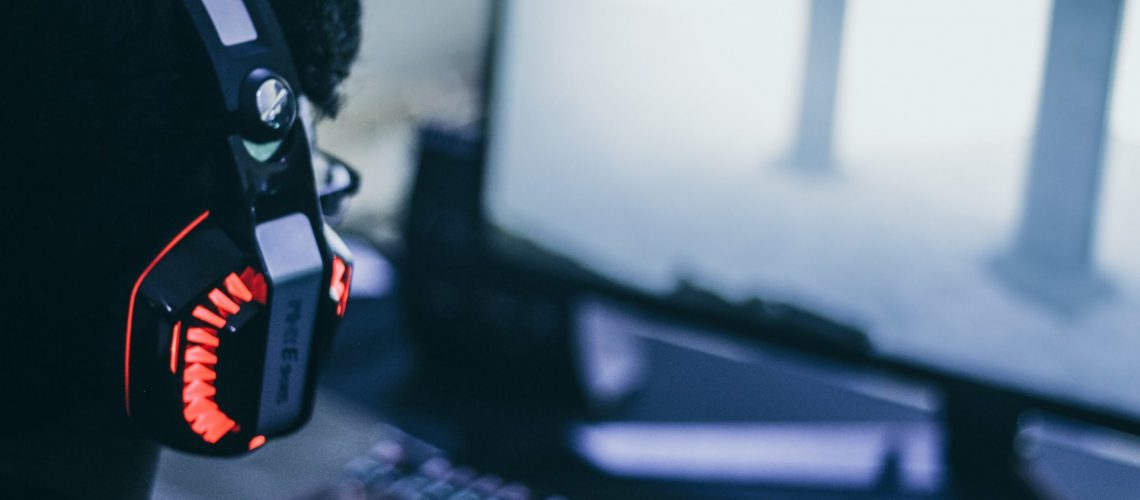You may have seen some esports players wearing glasses with colored lenses at tournaments or in their streaming sessions. But what is the purpose of these glasses and are they really useful?
What are gaming glasses?
Blue light or gaming glasses are designed to protect your eyesight. However, they do not protect you from sunlight like sunglasses, but from light emitted by your screen. The light emitted by your screen is mainly blue-violet light. But is it really harmful?
Is Blue light harmful?
It is frequently reported that blue light exposure may cause permanent eye damage by contributing to the destruction of the cells in the center of the retina.
A study published in the international journal of opthalmogy states that in the visible spectrum, short-wave blue light is closely related to eye light damage. This high energy blue light passes through the cornea and lens to the retina causing diseases such as dry eye, cataract, age-related macular degeneration, even stimulating the brain, inhibiting melatonin secretion, and enhancing adrenocortical hormone production, which will destroy the hormonal balance and directly affect sleep quality [1].
However, there are also studies that claim that the blue light emitted from electronic devices does not cause any damage. The harvard medical school states that the amount of blue light from electronic devices, including smartphones, tablets, LCD TVs, and laptop computers, is not harmful to the retina or any other part of the eye [2]. In addition, there is a considerable amount of companies that were fined for falsely advertising the effects of blue light glasses [3}.
This proves that not everything that is claimed about blue light and blue light glasses is true. The effects of blue light on the eyesight has not yet been finally researched.
With regard to a certain effect of blue light, however, the scientific community is largely in agreement.While light of any kind can suppress the secretion of melatonin, blue light, especially nights, does suppress the secretion of melatonin more powerfully than any other light. Melatonin is a sleep hormone that makes it easier for us to fall asleep and helps us get a firmer and better sleep. Harvard researchers have discovered in an experiment that blue light suppressed melatonin for about twice as long as green light and shifted circadian rhythms (process that regulates the sleep-wake cycle) by twice as much (3 hours vs. 1.5 hours) [4].
Further studies have also found evidence that blue light is a suppressor of melatonin in both children and adults [1,5,6]. It has also been shown that people who wear blue light glasses produce more melatonin than people who are exposed to blue light without protection. This effect is especially increased when exposed to blue light at night.
When do you need blue protection glasses?
If you find yourself in front of a screen for several hours a day, you should think about getting blue light/gaming glasses. Having trouble falling asleep and not sleeping well is another reason to consider blue light protection.
Blue light glasses can provide temporary help with eye pain. If you play a lot and don’t sleep well at night, your eyes will not recover and may hurt the next day. Blue light/gaming glasses can relieve the symptoms.
You should also use blue light glasses if you like to play in the dark. In the studies presented above, it has been repeatedly shown that the negative effects of blue light only get stronger at night. Therefore, if you play in the dark, it is advisable to protect your eyes.
Advantages of blue light/gaming glasses
- Reduce the negative effects of blue light
- Provide better sleep
- Slower eye fatigue and therefore faster regeneration.
- May prevent Eyepain
- May prevent Headaches
Clear vs yellow lenses
The difference between clear and yellow lenses is usually the degree of protection. Clear lenses have a lower protection factor, but you don’t have to get used to a color change. Darker lenses offer a stronger protection, but at the same time they may change your color perception and therefore take some time to get used to. Which lenses are right for you depends on the sensitivity of your eyes. However, we would suggest trying clear lenses with a lower protection factor first, before resorting to stronger glasses. If the protection is already sufficient for you and you feel a positive effect, you don’t need stronger (yellow) lenses.
Advice on buying blue light glasses
Blue light glasses are often sold as “gaming glasses”. What many people don´t know is that you can find much cheaper versions under the term “blue light glasses” than with the term “gaming glasses”. There is no difference between the glasses! Both blue light glasses and gaming glasses are available in different strengths (clear and yellow lenses). Do not be fooled by this marketing trick!
Almost every optician now offers blue light protection glasses. If you need blue light glasses of very good quality and/or a certain visual acuity, you should get detailed advice from your trusted optician. In the end, you may even pay less than buying an established brand and you can be sure that the glasses have been fitted to your eyes by professionals.
Conclusion
In science it is still controversial to what extent blue light really harms the eye. However, it is widely agreed that blue light has a negative effect on sleep and thus also on the recovery process of the eye. Blue light or gaming glasses are worth it for you if you play a lot, especially in night time. The glasses ensure that your sleep becomes better and your eyes regenerate faster. If you have frequent headaches, eye pain and sleep problems after long gaming sessions or if your eyes often feel tired, you should deffinetly try blue light protection glasses.
Sources
[1] Zhao, Zhi-Chun; Zhou, Ying; Tan, Gang; Li, Juan (2018): Research progress about the effect and prevention of blue light on eyes. In: International Journal of Ophthalmology 11 (12), S. 1999–2003. DOI: 10.18240/ijo.2018.12.20.
[2] Ramsey, David (2019): Will blue light from electronic devices increase my risk of macular degeneration and blindness? – Harvard Health Blog – Harvard Health Publishing. Online verfügbar unter https://www.health.harvard.edu/blog/will-blue-light-from-electronic-devices-increase-my-risk-of-macular-degeneration-and-blindness-2019040816365, last updated on 01.05.2019, last checked on 16.10.2020.
[3] Powell, Selina (2017): Boots Opticians fined £40,000 over misleading blue light advertising. Online available at https://www.aop.org.uk/ot/industry/high-street/2017/05/26/boots-opticians-fined-40000-over-misleading-blue-light-advertising, last checked on 16.10.2020.
[4] Harvard Health Letter (2012): Blue light has a dark side – Harvard Health. Online verfügbar unter https://www.health.harvard.edu/staying-healthy/blue-light-has-a-dark-side, last updated on 07.07.2020, last checked on 16.10.2020.
[5] Tähkämö, Leena; Partonen, Timo; Pesonen, Anu-Katriina (2019): Systematic review of light exposure impact on human circadian rhythm. In: Chronobiology International 36 (2), S. 151–170. DOI: 10.1080/07420528.2018.1527773.
[6] Lee, Sang‐il; Matsumori, Kouhei; Nishimura, Kana; Nishimura, Yuki; Ikeda, Yuki; Eto, Taisuke; Higuchi, Shigekazu (2018): Melatonin suppression and sleepiness in children exposed to blue‐enriched white LED lighting at night. In: Physiological Reports 6 (24). DOI: 10.14814/phy2.13942.




